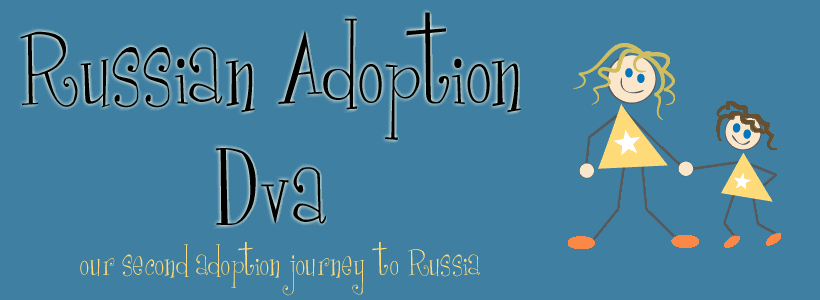
Info on Infant Attachment
Sunday, May 20, 2007
Infant Attachment Checklist Copyright by Walter D. Buenning, Ph.D., 1999
Symptom Examples
Adoptive moms share examples from their children's daily lives. Just a few of these symptoms may indicate a problem. Please consult with an attachment therapist if you have concerns about your child.
*I have indicated (below in red) those areas where we had to work with D when she came home at age 11 months. It took about 2 months for her to become "normal" in most of these areas. She still has a rather high tolerance for pain. It took her probably 6-8 months before she would "hold on" in a normal fashion (#14 below) when we carried her. She would grasp our shirt at the shoulder instead of holding us back. This was probably the most painful transition for me emotionally, but I had to realize, she just didn't know how!
I wanted to share that these things CAN be and most times ARE worked through. The main thing is that you are prepared and educated beforehand and even though you can't help but take it personally and feel hurt and rejected REMEMBER the child doesn't KNOW how to love you back, they have to be taught and LOVE TEACHES LOVE.
Sometimes it takes more than love and your family may need attachment therapy and there is NO SHAME in that. Get your child whatever help they need. Again, prepare for the worst and hope for the best! We were prepared to deal with WAY MORE than what D presented to us and we were happily relieved.
On Dr. Buenning's website, you may download a pdf file and print this checklist as well as a separate symptom checklist designed for children ages 5 years & older.
Each symptom is on a continuum from 0-10. Individual symptoms may present from mild to severe.
Symptom Examples
Adoptive moms share examples from their children's daily lives. Just a few of these symptoms may indicate a problem. Please consult with an attachment therapist if you have concerns about your child.
*I have indicated (below in red) those areas where we had to work with D when she came home at age 11 months. It took about 2 months for her to become "normal" in most of these areas. She still has a rather high tolerance for pain. It took her probably 6-8 months before she would "hold on" in a normal fashion (#14 below) when we carried her. She would grasp our shirt at the shoulder instead of holding us back. This was probably the most painful transition for me emotionally, but I had to realize, she just didn't know how!
I wanted to share that these things CAN be and most times ARE worked through. The main thing is that you are prepared and educated beforehand and even though you can't help but take it personally and feel hurt and rejected REMEMBER the child doesn't KNOW how to love you back, they have to be taught and LOVE TEACHES LOVE.
Sometimes it takes more than love and your family may need attachment therapy and there is NO SHAME in that. Get your child whatever help they need. Again, prepare for the worst and hope for the best! We were prepared to deal with WAY MORE than what D presented to us and we were happily relieved.
On Dr. Buenning's website, you may download a pdf file and print this checklist as well as a separate symptom checklist designed for children ages 5 years & older.
Each symptom is on a continuum from 0-10. Individual symptoms may present from mild to severe.
- 1. Cries; miserable all the time, chronically fussy
- 2. Resists comforting or nurturance
- 3. Resists or dislikes being held
- 4. Poor eye contact or avoids eye contact
- 5. Flat, lifeless affect (too quiet)
- 6. Likes playpen or crib more than being held
- 7. Rarely cries (overly good baby)
- 8. Angry or rageful when cries
- 9. Exceedingly demanding
- 10. Looks sad or empty-eyed
- 11. Wants to hold bottle as soon as possible
- 12. Stiffens or becomes rigid when held
- 13. Prefers being held with back toward mother
- 14. Does not hold on when being held (no reciprocal holding)
- 15. When held chest to chest, faces away
- 16. Does not return or reciprocate hugs
- 17. Generally unresponsive to parent
- 18. Cries or rages when held beyond his wishes
- 19. Overly independent play or makes no demands
- 20. Reaches for others to hold him rather than parent
- 21. Little or reduced verbal responsiveness
- 22. Does not return smiles
- 23. Shows very little imitative behavior
- 24. Prefers Dad to Mom
- 25. Gets in and out of parents lap frequently
- 26. Physically restless when sleeping
- 27. Does not react to pain (high pain tolerance)
12 Comments:
 **Non-Adoption Blogs**
**Non-Adoption Blogs**Mark Shultz's Bike Ride
Beth Moore's Blog
~~NEW BLOG-FINDS~~
O'Neal Family / Small World
Pease Adoption
Kouri Family
Becky and Keith
Rachel and Troy
Jenn wish upon a star
Jane's Journey
Carey and Norman
Shannon and Ken
Chris and Danica
****RUSSIA****
Adoption.com
Unexpected Miracles
Traci B.
Russian Adoption Blog
Minnesota Mama
Another Day in Paradise
Family Reunion
His, Hers and Ours
Hale family
Valerie
Hamersma Adoption
Adrienne and Jim
Road Home
Wendi and Trevor
Chris and Penny
Hot Dog
Rob and DeDe
Brandi and Steve
Always Wanted 4
Looking for Grace
Crowned with Laurel
Baby Bee
Abbye Anne
Brouillettes
Jeff & Jenny
From Russia
Kate - Wonderful Way
Tricia and Michael
Dad's Journey-IA
SCMountainGirl
BOCI Interns
****DOMESTIC****
Margaret's Blog
****Kazakhstan****
Pat and Alli
Dawn and Joe
Rollercoaster to Kaz
****Ukraine****
Finding Maddie
Bring My UA Kids Home
There and Back
****CHINA****
David and Amy's Dumpling
Kris-Waiting China Mom
Rachael in China
Adkins Adventure
Woodells
Lollipop's Legacy
Adoption and Fire
Mad Race for Macey
Chinese Starfish
7th Diamond
Love Takes You In
Waiting 4 Kailee
Kaffee Klatch
Lia
Chelley in Australia
Waiting for Chloe
Labor of My Heart
Journey to Mary
****ETHIOPIA****
Building a Family
**GUATEMALA**
Little Hannah
Guatemalan Blessing
Walters' Adoption
Ollie Baby
Praying them Home
Carrie's Adoption
Minnesota Mama
****VIETNAM****
Lucy in the Sky - Vietnam
**AT HOME WITH KIDS - and still blogging**
Life of Elle
Pickel
Stay at home mom at last
Woodworths
Hargis Adoption
The Next Step
Deborah's Toddlers
Doreen
**Lisa & Mike
Susan & Wayne
Kissack Chronicles
Our Moscow Baby
Jeff and Maria
Amazing Race
Pisarik Adoption
Lauren and Marco
3 Sons & a Princess
Bringing Evan Home
Confessions
Melissa and Mike
Our Adoption Journey
Sapp Family
Where in the World
Alison and Jim
Rhyne & Jake
Jamie and Suzanne
Still Waiting
Leap of Faith
Russian Adoption Diary
Four Feet More
Youngs go to Kaz
The Laukats
Salsa in China?
Journey to Gracie
Belanich
Two Ladybugs
Kleins in Germany
Miya's Memoirs
Love Daughter
Online Degree Programs




 Site Design By:
Site Design By:
My baby is blossoming, slowly, slowly, slowly. But some days it is a Herculean effort.
We continue to follow her progress and pray for her future. Her new family is very patient and has lots of good support and therapies.
I do not think PAP's realize the stress that attachment issues can cause within a family. A very good book on this subject is "An Unlit Path" by Deborah Hannah. http://www.amazon.com/gp/product/1600344852/103-6394096-9033411